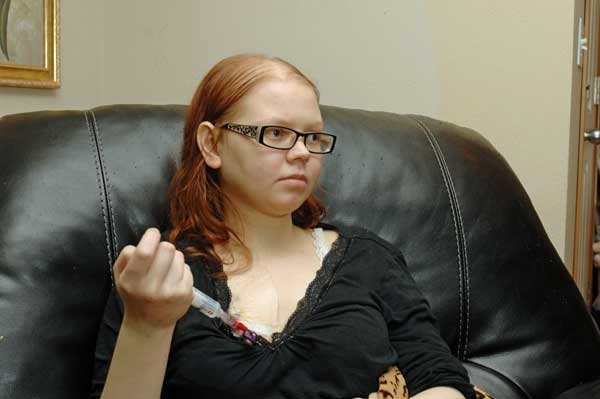 Savana Oberts, 24, self-administers an anti-nausea medication at her parents’ Lakebay home earlier this month. She is in line for an intestine and liver transplant. Photo by Scott Turner, KP News
Savana Oberts, 24, self-administers an anti-nausea medication at her parents’ Lakebay home earlier this month. She is in line for an intestine and liver transplant. Photo by Scott Turner, KP News
Three years ago, Lakebay resident Savana Oberts, 24, was a healthy, active junior at Western Washington University in Bellingham studying to be a teacher, when she was suddenly taken ill and had to be rushed into surgery.
Her small intestine had become tied in a knot and had to be removed.
After spending several days in ICU, Savana was able to return home to Lakebay where she has been awaiting a double organ transplant –– a small intestine and a liver –– since 2011.
Her life has been put on hold. Her dream of teaching English overseas is now just that –– a dream (for now).
Savana can walk around, but she tires very quickly and has to take all her nourishment through an IV because her digestive system can’t process real food. She has to inject herself with anti-nausea medicine several times a day as well.
“I have about 22 centimeters of my small intestine left. It’s supposed to be about 20-feet long,” she said from the recliner where she spends most of her time.
“I can’t eat, because your small intestine is what absorbs all the nutrients. So every night for 12 hours I have to take what’s called TPN by IV.”
TPN stands for Total Parenteral Nutrition.
“You can be on TPN for a long time, but it’s really bad for you,” Savana said. “It messed up my gall bladder pretty quickly.”
In 2012, her gall bladder had to be removed.
The medication also is affecting her liver, so she now also is a candidate for a liver transplant, although, since her doctor adjusted Savana’s TPN formula, her liver has improved. “So I may not need a new liver. But they won’t know for sure until they do the small intestine transplant,” she said.
Her daily meds include a bag of saline solution every day, nausea medicine every eight hours and Benadryl every night because of a skin condition which has worsened since the initial surgery.
The family can never be more than three hours from Seattle, because when Savana’s doctor finds the right small intestine and liver, she has just three hours to get to the University of Washington Medical Center for the transplant surgery.
“We have no idea when it will happen,” Cathy Oberts said. “It could be any time.”
Both organs need to come from the same donor, and, because of Savana’s small size, the organs will likely have to come from a teenager. “It’s her small size that’s the issue,” Cathy Oberts explained. “She’s pretty much the only one in her category in the Northwest region for small intestine and liver.”
When the call comes and Savana gets to the hospital, “… they’ll open her up so they can visually see her liver,” she continued. “They’ll make the decision on her liver right away and if she doesn’t need it, it will go to the next person in line.”
Right now, Savana’s condition is stable but she goes to UW Medical Center every two weeks for blood work and other tests to make sure she’s OK.
When the first episode occurred, Savana didn’t have insurance.
“Luckily, the hospital qualified her very fast for Medicaid,” her mom said. “That covered everything 100 percent.”
Since then, Savana has been switched to Medicare, so now there are co-pays to deal with.
So far the family has been able to pay them. But when the transplant takes place, there will be huge bills, they say.
“We recently heard that the transplant will be about $1.5 million – just for the transplant,” Cathy Oberts said. “The social worker at UW told us that Medicare will cover most of it, but we’ll still need $15,000 to $25,000 to cover the co-pays, travel, anti-rejection drugs and so forth.”
“And we’ve been told that the co-pay on the anti-rejection drugs is about $300 a month,” Savana interjected.
The Oberts have hosted several fundraising events to help cover Savana’s medical expenses, including a spaghetti feed at the KP Civic Center early on.
They’re also selling T-shirts at several local businesses and are registered on the HelpHopeLive website for donations. “They accept money for transplant patients and catastrophic injury patients,” Oberts explained. “They hold the money in a donation pool specifically for her so it doesn’t count as income, and its all tax deductible for the donors.”
The KP community has been very supportive and responsive, she said. “I’d be very honored if any local business would like to sell our T-shirts or would help us host an event.”
As for Savana, she’s shy about asking for donations.
“I hate asking for things, but it’s very helpful to us when someone does give something. Medication is very expensive, and I’m wanting to go back to school when this is all done and I’m not going to be able to afford that,” Savana said.
Savana’s father, Aaron Oberts, is thankful beyond words that his daughter is alive today.
“When I went to the hospital that first day, they told me she was going to die,” he said. “I want everybody to know how resilient Savana is. I don’t know if I could have gone through what she has.”
WANT TO HELP?
To contribute to Savana Oberts' medical fund, visit HelpHopeLive.org and search for Savana Oberts. For information, email catoberts@yahoo.com. [/box]
UNDERWRITTEN BY THE FUND FOR NONPROFIT NEWS (NEWSMATCH) AT THE MIAMI FOUNDATION, THE ANGEL GUILD, ADVERTISERS, DONORS AND PEOPLE WHO SUPPORT INDEPENDENT, NONPROFIT LOCAL NEWS